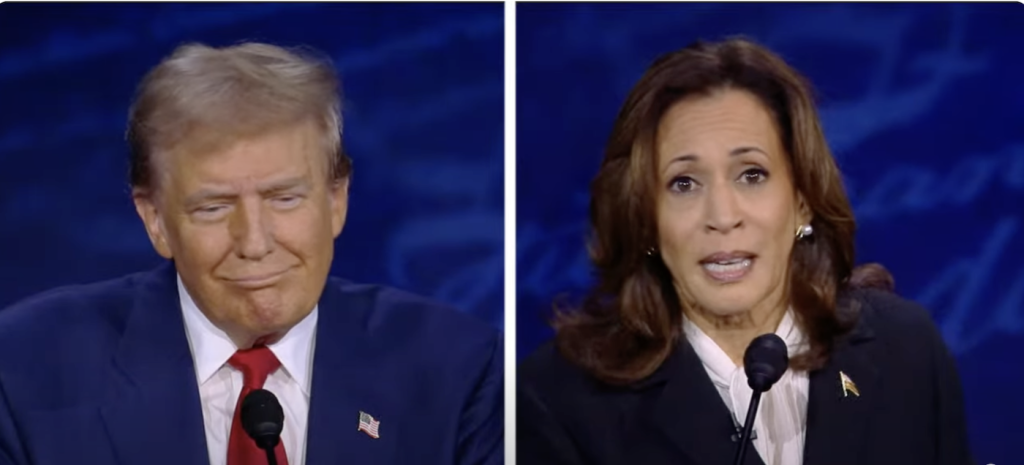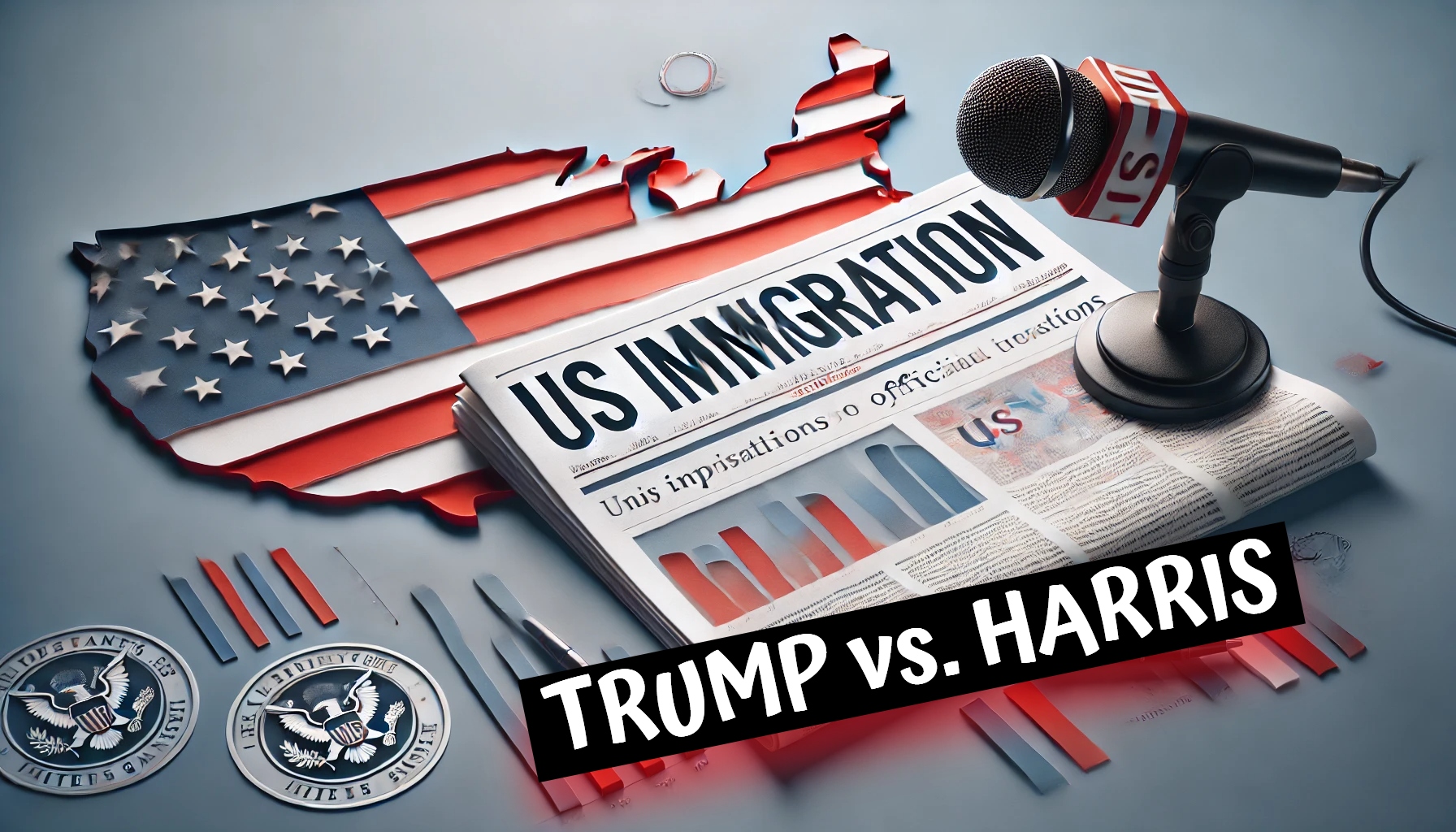US Immigration: Key Issues for the 2024 Election. US Immigration – with all its complexities – is a deeply rooted American tradition. Today, it’s a top concern for U.S. voters, especially as the 2024 election approaches.
Former President Donald Trump continues his hardline approach against illegal immigration, advocating for strict border security measures that he implemented during his presidency. He also supports reducing legal immigration pathways, including temporary visas and refugee resettlement programs.
In contrast, Vice President Kamala Harris, historically a proponent of immigrant rights, has taken a more conservative turn on US immigration policies. This shift aligns with the Biden-Harris administration’s recent tightening of asylum laws after record-breaking levels of illegal border crossings.
US Immigration: A Central Election Issue
U.S. Immigration plays a critical role in this year’s election, ranking high among voter concerns. While Trump emphasizes border control as a core issue, Harris offers an alternative, more moderate approach, yet still focuses on reforming the broken US immigration system. Trump’s extensive political career has placed immigration reform at the center of his platform, especially tackling illegal immigration. Harris, with her experience as a former prosecutor in California, promotes a balanced approach, though her detailed immigration agenda remains less fleshed out.
The next president’s ability to enact significant immigration changes will depend on numerous factors, including cooperation with Mexico, potential lawsuits, and securing funding from Congress, which hasn’t passed major immigration reform since the 1990s.
Here’s a breakdown of where the candidates stand on three critical immigration issues.
Trump’s Stance on Illegal US Immigration
Both candidates are committed to securing U.S. borders, but Trump takes a more aggressive stance, labeling the current situation as an “invasion.” He plans to launch the “largest deportation operation in US history,” using military involvement to target undocumented immigrants.
Trump has promised to reinstate the controversial Remain in Mexico policy, which forces asylum seekers to wait outside the U.S. until their immigration hearings. He also vows to end birthright citizenship for children born to unauthorized immigrants – a move that would likely face immediate legal challenges.
Harris’ Stance on Illegal US Immigration
Harris, on the other hand, has downplayed her involvement in handling the surge of unauthorized migrants during the Biden administration, instead promoting recent reductions in illegal crossings following the introduction of stricter asylum rules. While Trump labels her as Biden’s “border czar,” Harris highlights her former role as California Attorney General, where she tackled issues like drug trafficking along the border.
Harris supports a pathway to citizenship for DACA recipients (Deferred Action for Childhood Arrivals), allowing undocumented immigrants who arrived as children to remain in the country legally. However, ongoing litigation could impact DACA’s future, and Harris blames Trump for blocking bipartisan immigration reform that could have bolstered resources for border security.
US Immigration Parole: Where the Candidates Stand
U.S. Immigration parole offers temporary permission for certain immigrants to stay in the U.S., and it has become a controversial topic. The Biden-Harris administration expanded parole programs, including for Cubans, Haitians, Nicaraguans, and Venezuelans, providing a “safe and orderly” path to legal status. However, conservative critics argue this broad use of parole oversteps government authority.
Trump has pledged to end what he calls the “abuse of immigration parole,” arguing that it’s a loophole allowing unauthorized immigrants to stay in the country. He also plans to revoke Temporary Protected Status (TPS) for Haitian immigrants and has made inflammatory remarks regarding their impact on local communities.
Refugee Resettlement: Harris vs. Trump

The candidates’ positions on refugees diverge sharply. The Biden-Harris administration admitted over 100,000 refugees in fiscal year 2024, signaling ongoing support for the US refugee resettlement program. Harris remains committed to maintaining high refugee admission caps.
In contrast, Trump drastically cut refugee admissions during his presidency and has pledged to halt the program altogether if reelected. He also plans to revive the controversial travel ban targeting immigrants from Muslim-majority countries. He has stated he will ban refugees from “terror-infested areas,” specifically mentioning the Gaza Strip.
As the election draws closer, immigration remains a critical issue. The future of US immigration policy will be shaped by the voters’ choice between these two contrasting approaches.
The Importance of Immigration
Immigration involves people moving from one country to another to live permanently. The United States has a rich history of immigration, with people from all over the world contributing to its development and diversity. Immigrants bring different cultures, skills, and ideas, enriching American society. However, immigration policies and practices have always been a point of contention, influencing political debates and decisions.
Donald Trump’s Hardline Approach
Donald Trump is known for his strict stance on immigration. Throughout his political career, he has emphasized the need for strong border enforcement and strict immigration laws. Here are some of the key aspects of his approach:
- Border Wall: Trump’s most well-known proposal is building a wall along the US-Mexico border to prevent illegal immigration. He argues that this wall is necessary to protect the country from unauthorized entry.
- Travel Ban: During his presidency, Trump introduced a travel ban that restricted entry from several predominantly Muslim countries, claiming it was to prevent terrorism.
- Ending DACA: Trump attempted to end the Deferred Action for Childhood Arrivals (DACA) program, which protects young immigrants brought to the U.S. as children from deportation. He believes it encourages illegal immigration.
- Large-Scale Deportations: Trump has proposed involving the military in what he calls the “largest deportation operation in American history,” targeting undocumented immigrants. He often uses harsh language, referring to illegal immigration as an “invasion.”
- Remain in Mexico Policy: Trump plans to revive the “Remain in Mexico” policy, requiring asylum seekers at the southern border to wait in Mexico for their immigration court dates.
- Ending Birthright Citizenship: Trump has expressed a desire to end birthright citizenship for children born in the U.S. to unauthorized immigrants, which would likely lead to legal challenges.
For more information on Trump’s immigration policies, visit the White House Archives – Trump Administration.
Kamala Harris’s Reform-Oriented Approach
Kamala Harris has been a longtime advocate for immigrants and has a different approach compared to Trump. While she supports strong border security, she also emphasizes the need for humane and fair immigration policies. Here are some key points about her stance:
- Pathway to Citizenship: Harris advocates for a pathway to citizenship for undocumented immigrants already in the U.S. She believes that immigrants who contribute to society should have the opportunity to become citizens.
- Protecting DACA: Unlike Trump, Harris supports the DACA program and aims to protect Dreamers, the young immigrants benefiting from it. She believes they deserve stability and a chance to contribute to the country without fear of deportation.
- Reforming Asylum Policies: The Biden-Harris administration has tightened asylum policies to manage the historically high levels of illegal border crossings. Harris supports these reforms to ensure the immigration system is orderly and fair.
- Addressing Root Causes: Harris focuses on addressing the root causes of immigration, such as violence and poverty in immigrants’ home countries. She believes in working with other nations to improve conditions, reducing the need for people to migrate.
- Border Security and Humanitarian Approach: Harris supports strong border security measures while ensuring that immigrants are treated humanely. She has committed to taking further actions to keep the border closed between ports of entry.
For more details on Kamala Harris’s immigration policies, visit Kamala Harris Senate Website.
Key Differences Between Trump and Harris
While both Trump and Harris discuss immigration firmly, their approaches differ significantly:
- Tone and Language: Trump often uses harsh and demonizing rhetoric toward immigrants, portraying them as threats. Harris speaks with compassion and empathy, recognizing the contributions of immigrants.
- Policy Focus: Trump emphasizes strict enforcement and physical barriers like the border wall. Harris focuses on creating pathways to citizenship and addressing the underlying causes of immigration.
- Treatment of Immigrants: Trump’s policies often lead to the detention and deportation of immigrants. Harris advocates for a humane and fair system that respects the rights of immigrants.
The Impact of These Policies for US Immigration
The immigration policies of Trump and Harris have far-reaching effects on immigrants and the country as a whole:
- On Immigrants: Trump’s policies can create a climate of fear and uncertainty for immigrants, making their lives more challenging. Harris’s policies aim to provide stability and opportunities for immigrants to thrive.
- On the Economy: Immigrants significantly contribute to the U.S. economy through their labor and entrepreneurship. Supportive immigration policies can boost economic growth, while restrictive measures may hinder it.
- On Society: How the U.S. treats its immigrants reflects its values as a nation. Policies that are fair and humane show a commitment to diversity and human rights.
Conclusion on US Immigration
In the debate on US immigration, both Trump and Harris present strong views, but their approaches are markedly different. Trump focuses on strict enforcement and deterrence, while Harris emphasizes humane treatment and comprehensive reform. Understanding these differences is crucial for making informed decisions about the future of immigration in the United States.
For more information on US immigration policies and the differences between Trump and Harris, visit the US Immigration Policy Center and Biden-Harris Administration US Immigration.

